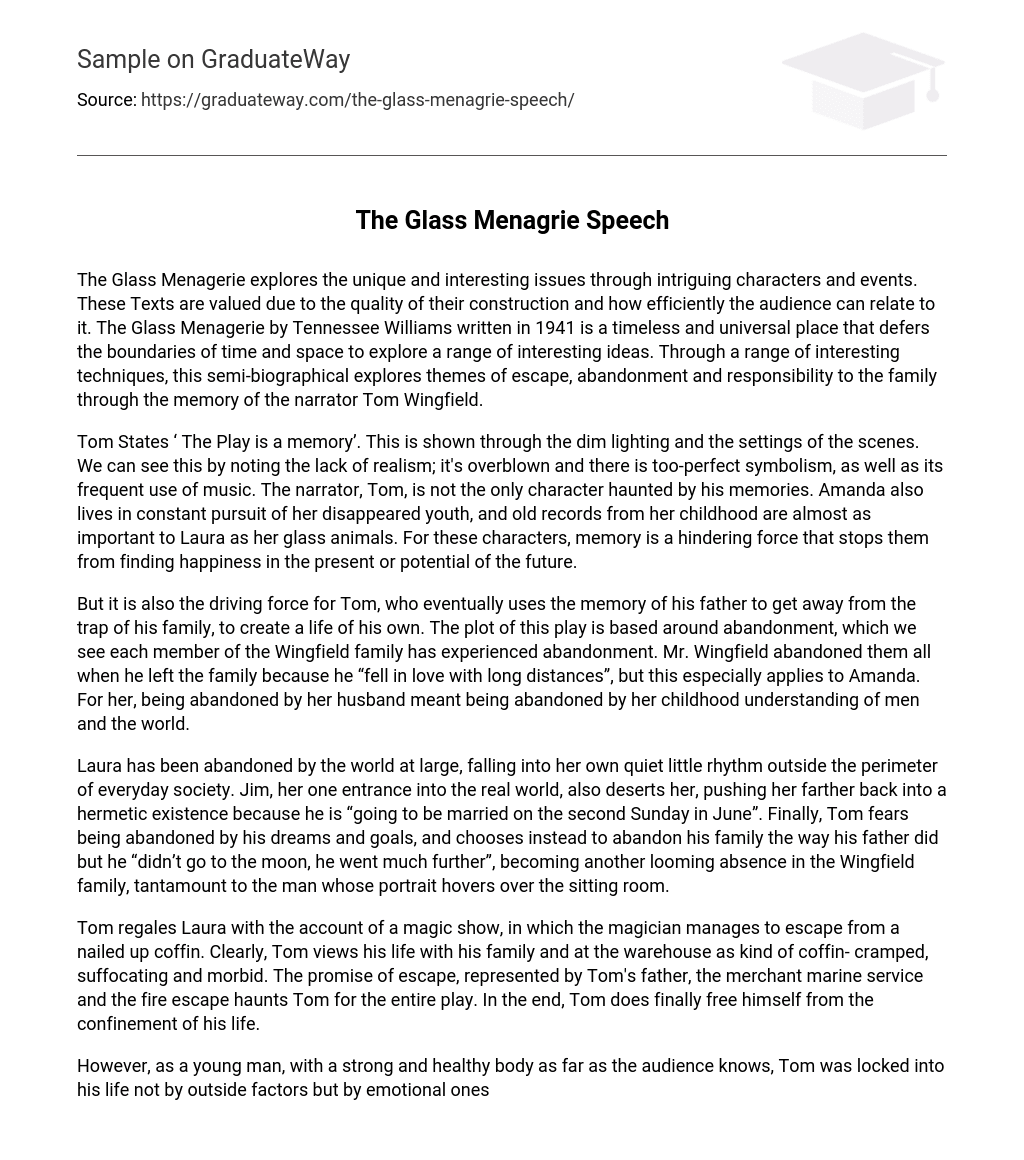The Glass Menagerie explores the unique and interesting issues through intriguing characters and events. These Texts are valued due to the quality of their construction and how efficiently the audience can relate to it. The Glass Menagerie by Tennessee Williams written in 1941 is a timeless and universal place that defers the boundaries of time and space to explore a range of interesting ideas. Through a range of interesting techniques, this semi-biographical explores themes of escape, abandonment and responsibility to the family through the memory of the narrator Tom Wingfield.
Tom States ‘ The Play is a memory’. This is shown through the dim lighting and the settings of the scenes. We can see this by noting the lack of realism; it’s overblown and there is too-perfect symbolism, as well as its frequent use of music. The narrator, Tom, is not the only character haunted by his memories. Amanda also lives in constant pursuit of her disappeared youth, and old records from her childhood are almost as important to Laura as her glass animals. For these characters, memory is a hindering force that stops them from finding happiness in the present or potential of the future.
But it is also the driving force for Tom, who eventually uses the memory of his father to get away from the trap of his family, to create a life of his own. The plot of this play is based around abandonment, which we see each member of the Wingfield family has experienced abandonment. Mr. Wingfield abandoned them all when he left the family because he “fell in love with long distances”, but this especially applies to Amanda. For her, being abandoned by her husband meant being abandoned by her childhood understanding of men and the world.
Laura has been abandoned by the world at large, falling into her own quiet little rhythm outside the perimeter of everyday society. Jim, her one entrance into the real world, also deserts her, pushing her farther back into a hermetic existence because he is “going to be married on the second Sunday in June”. Finally, Tom fears being abandoned by his dreams and goals, and chooses instead to abandon his family the way his father did but he “didn’t go to the moon, he went much further”, becoming another looming absence in the Wingfield family, tantamount to the man whose portrait hovers over the sitting room.
Tom regales Laura with the account of a magic show, in which the magician manages to escape from a nailed up coffin. Clearly, Tom views his life with his family and at the warehouse as kind of coffin- cramped, suffocating and morbid. The promise of escape, represented by Tom’s father, the merchant marine service and the fire escape haunts Tom for the entire play. In the end, Tom does finally free himself from the confinement of his life.
However, as a young man, with a strong and healthy body as far as the audience knows, Tom was locked into his life not by outside factors but by emotional ones, meaning by his loyalty to and love for Laura and Amanda. Escape for Tom means the repressing and denial of these emotions in himself, and it means hurting his mother and sister. Escaping from home might not even mean true escape for Tom. He could wander away from his home, Laura and Amanda as possible, but the memories and feeling will still follow him.
Instead of finding a life with freedom in it, he could be living life as a fugitive, but in his own mind. The theme illusion vs. reality was another major theme that was put fourth in the play. Amanda however is caught up in the illusion of her up bringing, which has taught her that a man will support a woman and there are certain rules for wanting one. Her experience however, proves this to the contrary, when her husband runs out on the family and leaves her to fend for herself, and later when Laura’s shyness prevents her from a normal socialization in life.
Still, Amanda never stops believing that gentlemen will soon call upon her and make her life better. At the same time, she inflicts the theses illusions and reality on her children; she believes that if tom’s finds a husband for Laura, it will take care of their problems. The quote ‘ you don’t know anything, you live in a dream: you manufacture illusions. The idea that tom can solve all there problems with the replacement is itself an illusion, one that’s quickly eradicated by reality once he brings home a gentlemen caller for Laura. In The Glass Menagerie, family means obligations.
This play raises questions of duty and responsibility to your other family members, and for the most part in gender specific roles. We see that it is the job of the male to bring home money, and the daughter to look pretty and get married. This also features the notion of abandonment, as a father leaves the family behind. There is also the notion of children taking after their parents; Tom leaves the family just as his father did, and Amanda wishes her daughter were as popular as she used to be. We see fighting between mother and son over both trivial matters, such as dinner etiquette, and larger issues, such as work and life goals.
Lastly, this play examines the relationship between sister and brother, as Tom feels both protective and later guilty with regards to his sister Laura. During the play a lot of themes, dramatic techniques showed and explained they way that the glass menagerie by Tennessee Williams was a memorable play through threw the ideas Williams put worth to explain more what characters were going through throughout this painful memory of toms perspective. This was shown strongly threw abdonment, memory, illusion vs. reality, escape and family.





